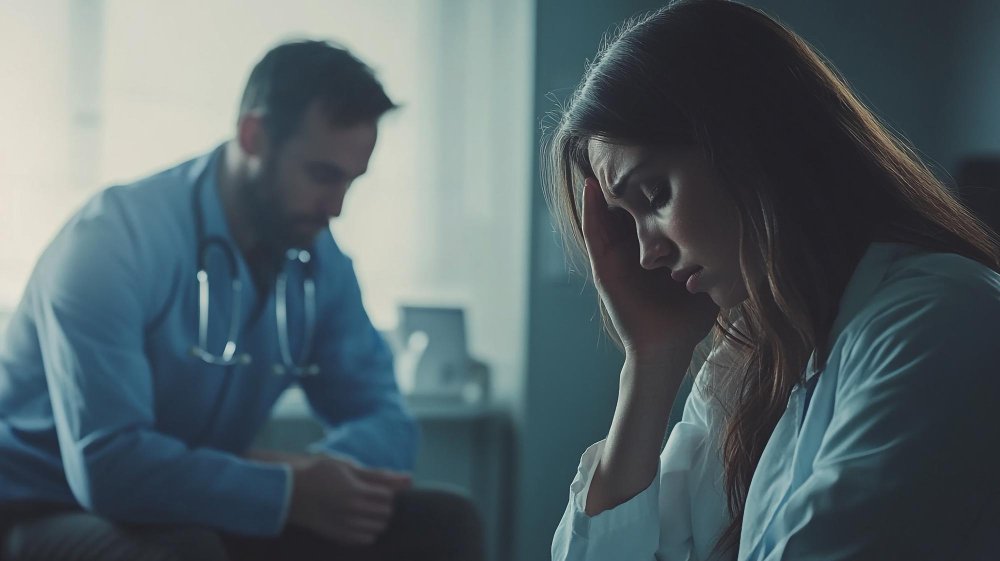Urgent Care for Mental Health: What You Need to Know
Stay Fit Pune – Did you know only 23% of people with depression in developed countries get the help they need? This shows how important it is to have easy access to mental health services, especially in emergencies. With anxiety, depression, and panic attacks affecting millions in the U.S., knowing about Urgent Care for Mental Health is key.
Urgent care centers are there to help in these tough times. They offer quick support for those dealing with severe symptoms.
This article will cover the basics of mental health urgent care. It will tell you what to expect when you need help. Knowing about the services available and the signs that you or someone you know might need urgent care can help you make better choices for mental health support.
Understanding Mental Health Urgency
It’s important to know when mental health issues need immediate help. Conditions like anxiety, depression, PTSD, and severe mood disorders can get worse fast. Getting help quickly is key to better health outcomes.
Places like MIND 24-7 offer 24/7 mental health support. They help people of all ages, no matter their financial situation. These centers focus on solving urgent mental health problems with crisis stabilization and counseling.
Emergency rooms deal with serious crises, including mental health emergencies. But, waiting times can be long. Urgent care centers, like In and Out Urgent Care, offer quick help for less severe issues. They avoid the long waits of emergency rooms.
Urgent care centers provide fast, tailored mental health care. Patients get focused attention and a care plan that fits their needs. Knowing when to go to urgent care is crucial for managing mental health issues and preventing crises.
What is Urgent Care for Mental Health?
Urgent care for mental health offers vital support for those in psychological distress. These centers aim to help quickly, unlike traditional psychiatric services. Knowing the difference between general urgent care and psychiatric urgent care is key in a crisis.
Difference Between Urgent Care and Psychiatric Urgent Care
General urgent care centers handle both physical and mental health issues. They provide services like assessments and stabilization. On the other hand, psychiatric urgent care focuses only on mental health. It offers specific help for those in crisis, ensuring they get the right treatment.
Types of Mental Health Services Offered
Psychiatric urgent care centers provide many services. You can get psychological assessments, medication management, and crisis intervention. They also offer crisis stabilization and referrals for ongoing care.
Follow-up services include residential treatment, intensive outpatient programs, and outpatient counseling. These support your long-term recovery.
Can You Go to Urgent Care for Mental Health?
Yes, you can go to urgent care for mental health issues. Urgent care clinics can handle many mental health problems. This includes anxiety, depression, PTSD, and bipolar disorder. Doctors and nurse practitioners are there to help.
Common Mental Health Issues Treated at Urgent Care
Urgent care centers can help with many mental health issues. They can assist with severe anxiety, panic attacks, and acute depression. They also help with insomnia, substance abuse, and eating disorders.
Signs you might need urgent care include feeling sad or irritable a lot. You might also have trouble sleeping, changes in appetite, or trouble concentrating. If you have thoughts of self-harm or harming others, seek help right away.
When to Seek Help from Urgent Care
Seek urgent care if your symptoms are overwhelming. If your mental health issues are affecting your daily life or have lasted for weeks, it’s time to go. Urgent care is a good option for non-life-threatening mental health issues.
They offer quick assessments and referrals for more specialized care. In a crisis, remember that the National Suicide Prevention Lifeline and the Crisis Text Line are there to help.
Recognizing a Mental Health Crisis
A mental health crisis is a serious situation that needs quick help. Spotting the signs early is key to getting the right help. Look out for signs like sudden mood changes or self-harm thoughts. These are clear warnings that someone needs professional help right away.
Symptoms That Indicate Immediate Care is Necessary
Signs of a mental health crisis include sudden changes in behavior. You might see someone acting very anxious or agitated. If they talk about harming themselves, it’s a serious warning sign.
Experts say a crisis happens when someone’s actions could hurt themselves or others. Spotting these signs early helps in getting the right help fast.
Understanding Psychological Emergencies
Psychological emergencies can come from many sources like relationship problems or trauma. Knowing when to act can make a big difference. It’s about seeing how serious someone’s behavior is.
It could be anything from feeling disconnected from reality to acting in ways that harm themselves. Getting help from mental health experts is crucial. It helps keep someone safe and ensures they get the care they need.
Self-Care Strategies for Managing Mild Mental Health Concerns
Creating self-care plans is key to handling mild mental health issues. Adding simple yet powerful habits to your day can boost your mood. Focus on regular exercise, enough sleep, and healthy eating.
Importance of Regular Physical Activity
Regular exercise is great for your mind. Studies prove that active people feel better mentally than those who don’t move much. Exercise releases happy chemicals that lift your mood and cut stress.
Even a short walk or a home workout can help. It’s a simple way to care for your mental health.
Role of Nutrition and Sleep in Mental Health
What you eat and how much you sleep matter a lot for your mind. Not getting enough sleep can lead to more mental health issues. Eating well and drinking enough water helps too.
Research shows that staying hydrated can lower depression and anxiety. Taking care of these areas can improve your mental health.
Steps You Can Take in a Mental Health Emergency
Facing a mental health emergency can feel overwhelming. It’s crucial to act quickly to help manage symptoms and find the right support. Knowing where to find help can greatly aid your recovery.
Immediate Actions to Stabilize Symptoms
When in crisis, grounding techniques can help you stay present. Try focusing on your breathing, counting to five on each inhale and exhale. Physical activities like walking or stretching can also help reduce anxiety.
If you feel safe, reaching out to trusted friends or family can offer support. If you’re unsure, you can visit an emergency room or call a mobile crisis team for help. Crisis Stabilization Units and Extended Observation Units offer intensive support for less than 24 hours. In severe cases, involuntary hospitalization may be needed for up to three days.
Resources and Support Following Urgent Care Visits
After urgent care, setting up a follow-up plan is key. This might include referrals to outpatient therapists or community mental health resources. Use crisis plans that outline symptoms and actions to take during an episode.
The National Suicide Prevention Lifeline is available 24/7 for support. Exploring walk-in clinics and other resources can help with ongoing care and counseling.
“Crisis services are available to help with mental health emergencies anywhere and anytime.”
Understanding and using available resources is key to recovery. Remember, seeking help is a sign of strength, not weakness. You are not alone in this journey.
Urgent Mental Health Treatment: What to Expect
Visiting an urgent care for mental health can be scary. But, these places are ready to help with many mental health issues. They focus on quickly assessing and stabilizing you. You’ll get checked out, and if needed, they might give you medicine.
Typical Process During Your Visit
When you get to an urgent care, they’ll check how serious your situation is. They’ll ask about your mental health history and symptoms. They might use crisis strategies to help you feel better right away.
Your treatment will be based on what you need. They might give you medicine if it’s safe for you.
Follow-Up Care and Long-Term Management Options
After urgent care, you’ll need to keep seeing mental health professionals. This could be psychiatrists or therapists. They’ll help you keep working on your mental health.
It’s important to keep going to these appointments. They help deal with deeper issues and stop future problems. You can also get help from the Mental Health Access Team or the 988 Suicide & Crisis Lifeline.
When Should You Seek Urgent Care Assistance for Your Mental Health?
Knowing when to seek urgent care for mental health is crucial. It can greatly affect your well-being. Look out for signs like distressing symptoms or sudden behavior changes. These signs can help you decide if you need urgent care for your mental health.
Scenarios Requiring Urgent Mental Health Evaluation
Some situations call for an urgent mental health check. Feeling hopeless, overwhelmed with anxiety, or noticing big behavior changes are red flags. If you’re thinking about suicide, feel detached from reality, or are in severe emotional pain, get help right away.
Recognizing these signs early can stop your mental health from getting worse. It also opens doors to effective treatments.
Signs That It’s Time to Seek Professional Help
There are clear signs you need professional help fast. If you can’t do daily tasks, lose interest in things you used to love, or symptoms get worse, it’s time to act. If your usual ways of dealing with problems don’t work, it’s urgent to seek help.
Knowing these signs helps you tackle your mental health challenges better. It’s a step towards getting the support you need.
Conclusion
It’s key to understand the importance of urgent care for mental health. This care is vital for handling serious mental health issues like severe depression and suicidal thoughts. Seeking help quickly is a big step towards better mental health.
Even though there are challenges like stigma and cost, urgent care for mental health is crucial. It offers immediate help and treatment in many places. Talking openly about mental health can help remove the stigma, making it easier to get help.
Putting your mental health first is essential. Knowing when to seek urgent care and where to find help empowers you and others. Getting support quickly can change your life, leading to recovery and better mental health.
FAQ
What types of services can I expect at a mental health urgent care facility?
You can expect initial assessments, medication management, and crisis intervention at mental health urgent care. They also provide referrals for ongoing treatment to help in emergencies.
How do I recognize when I should seek urgent mental health treatment?
Look for signs like intense anxiety, hopelessness, suicidal thoughts, or sudden behavior changes. If you see these, get help right away.
What self-care strategies can I implement for mild mental health concerns?
For mild concerns, try regular exercise, a balanced diet, and enough sleep. These can improve your mood and mental health, possibly avoiding urgent care.
What should I do in a mental health emergency?
In an emergency, use grounding techniques to manage emotions. Seek social support and have resources ready for follow-up care after urgent care.
What can I expect during a visit to an urgent care clinic for mental health?
Expect an initial assessment, possible medication, and immediate help tailored to your situation. Follow-up care is key for managing your mental health.
When is it critical to seek urgent care for mental health?
Seek urgent care for severe symptoms like mood swings, despair, or when usual coping strategies fail. Knowing these signs is crucial for timely help.



